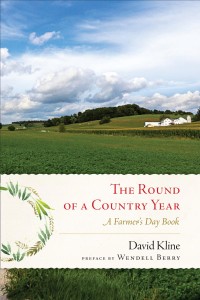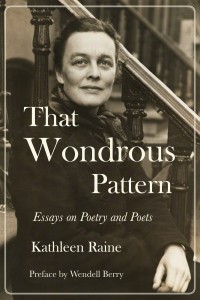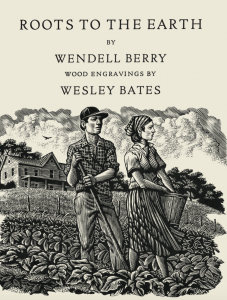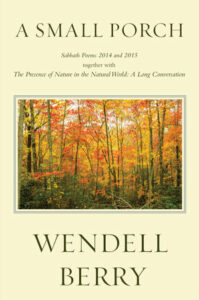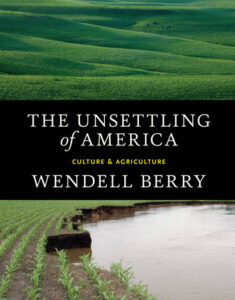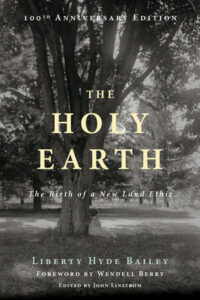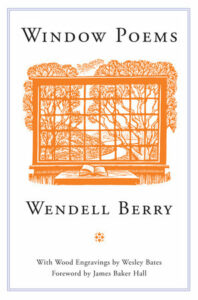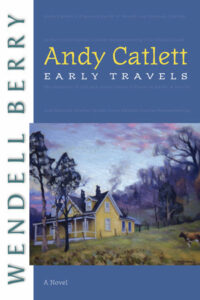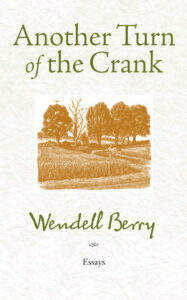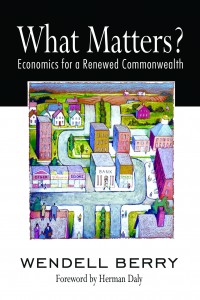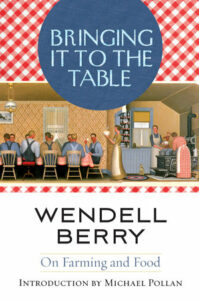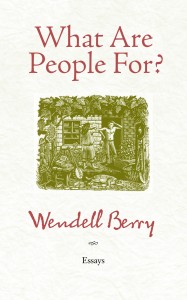Wendell Berry
Wendell Berry is the author of fifty books of poetry, fiction, and essays. He was recently awarded the Cleanth Brooks Medal for Lifetime Achievement by the Fellowship of Southern Writers and the Louis Bromfield Society Award. For over forty years he has lived and farmed with his wife, Tanya, in Kentucky.
Subscribe to our newsletter for news & events from Counterpoint Press.
Books
Round of a Country Year
A Farmer's Day Book
David Kline has been called a "twentieth–century Henry David Thoreau" by his friends and contemporaries; an apt comparison given the quiet exuberance with which he records the quotidian goings–on on his organic family farm. Under David's attentive gaze and in his clear, insightful prose the reader is enveloped in the rhythms of farm life; not only the planting and harvesting of crops throughout the year, but the migration patterns of birds, the health and virility of honeybees left nearly to their own devices, the songs and silences of frogs and toads, the disappearance and resurgence of praying mantises in fields–turned woodlands, the search for monarch butterflies in the milkweed. There's rhythm in community, too—neighbors gathering to plant potatoes or to maintain an elderly friend's tomato garden, organic farming conferences and meetings around family dining tables or university panels.Interspersed with local lore (when the spring's first bumblebee appears the children can go barefoot) is deep technical knowledge of cultivation and land management and the hazards of modern agri–business. Kline records statewide meetings of district supervisors, knows which speakers and committee chairmen are in the pockets of the oil and gas lobbyists, stands up and says his part.
At a time when America's population is being turned toward the benefits of small, local farming practices on our health and our environment, Kline's daybook offers a striking example of the ways in which we are connected to our environment, and the pleasure we can take in daily work and stewardship.
That Wondrous Pattern
Essays on Poetry and Poets
“There is no exaggeration in pointing out that these essays are addressed to the soul of the reader. They are not academic exercises in erudition as a contribution to ‘Eng. Lit.’” —from the introduction by Brian KeebleKathleen Raine was one of the greatest British poets of the last century. Born to a deeply literary and spiritual household, she went on to study at Cambridge, where she met Jacob Bronowski, William Empson, and Malcolm Lowry. A dedicated neoPlatonist, she studied and presented the works of Thomas Taylor and wrote seminal books on William Blake. With Keith Critchlow, Brian Keeble, and Philip Sherrard, she founded, in 1981, the Temenos Academy of Integral Studies, its journal Temenos, and, later, the Temenos Academy Review. HRH The Prince of Wales became the patron of the academy in 1997.
For our new selection, That Wondrous Pattern, Raine offers sixteen essays that range from “The Inner Journey of the Poet” and “What Is Man?” to essays on Blake, Wordsworth, Hopkins, Yeats, Eliot, and several others. The centerpiece, “What Is the Use of Poetry?”, is a rigorous defense of the great art. Editor Brian Keeble himself contributes a fascinating introduction to Raine’s work, and Wendell Berry, a colleague and friend of hers, offers a preface.
All who spend time in the presence of this wonderful writer will leave newly entranced with the art and use of the beautiful, convinced that “it is only in moments when we transcend ourselves that we can know anything of value.
Roots to the Earth
Poems and a Story
In 1995, Wendell Berry’s Roots to the Earth was published in portfolio form by West Meadow Press. The wood etchings of celebrated artist and wood engraver, Wesley Bates, were printed from the original wood blocks on handmade Japanese paper. In 2014, this work was reprinted at Larkspur Press, along with additional poems. It is now with great pleasure that Counterpoint reproduces this collaborative work for trade publication, as well as expanding it with the inclusion of a short story, “The Branch Way of Doing,” and additional engravings by Bates.In his introduction to the 2014 collection, Bates wrote: "As our society moves toward urbanization, the majority of the population views agriculture from an increasingly detached position. . . In his poetry [Berry] reveals tenderness and love as well as anger and uncertainty. . . The wood engravings in this collection are intended to be companion pieces to. . . the way he expresses what it is to be a farmer."
A Small Porch
Sabbath Poems 2014 and 2015
This collection of Wendell Berry essays and poems—all written outdoors on the Sabbath—“[shines] with the gentle wisdom of a craftsman who has thought deeply about the paradoxical strangeness and wonder of life” (The Christian Science Monitor).More than thirty–five years ago, Wendell Berry began spending his sabbaths outdoors, when the weather allowed, walking and wandering around familiar territory, seeking a deep intimacy only time could provide. These walks sometimes yielded poems. Each year since, he has completed a series of these poems dated by the year of its composition.
This new sequence provides a virtual syllabus for all of Berry’s cultural and agricultural work in concentrated form. Many of these poems—including a sequence at mid–year of 2014—were written on a small porch in the woods, a place of stillness and reflection, a vantage point “of the one / life of the forest composed / of uncountable lives in countless / years, each life coherent itself within / the coherence, the great composure, of all.”
Recently Berry has been reflecting on more than a half century of reading, to discover and to delight in the poetical, spiritual, and cultural roots of his work. In The Presence of Nature in the Natural World, Berry’s survey begins with Alan of Lille’s twelfth–century work, The Plaint of Nature. From the Bible through Chaucer, from Milton to Pope, from Wordsworth to the moderns, Berry’s close reading is exhilarating. Moving from the canon of poetry to the sayings and texts found in agriculture and science, closely presented, we gain new appreciation for the complexity of the issues faced in the twenty–first century by the struggling community of humans on earth.
With this long essay appended to these new Sabbath Poems, the result is an unusual book of depth and engagement. A new collection of Wendell Berry poems is always an occasion for celebration, and this eccentric gathering is especially so.
The Unsettling of America
Culture & Agriculture
Since its publication in 1977, The Unsettling of America has been recognized as a classic of American letters. In it, Wendell Berry argues that good farming is a cultural and spiritual discipline. Today’s agribusiness, however, takes farming out of its cultural context and away from families. As a result, we as a nation are more estranged from the land—from the intimate knowledge, love, and care of it.Sadly, his arguments and observations are more relevant than ever. Although “this book has not had the happy fate of being proved wrong,” Berry writes, there are people working “to make something comely and enduring of our life on this earth.” Wendell Berry is one of those people, writing and working, as ever, with passion, eloquence, and conviction.
The Holy Earth
The Birth of a New Land Ethic
The agrarian tradition runs as an undercurrent through the entire history of literature, carrying the age–old wisdom that the necessary access of independent farmers to their own land both requires the responsibility of good stewardship and provides the foundation for a thriving civilization. At the turn of the last century, when farming first began to face the most rapid and extensive series of changes that industrialization would bring, the most compelling and humane voice representing the agrarian tradition came from the botanist, farmer, philosopher, and public intellectual Liberty Hyde Bailey. In 1915, Bailey's environmental manifesto, The Holy Earth, addressed the industrialization of society by utilizing the full range of human vocabulary to assert that the earth's processes and products, because they form the governing conditions of human life, should therefore be understood not first as economic, but as divine. To grasp the extent of human responsibility for the earth, Bailey called for "a new hold" that society must take to develop a "morals of land management," which would later inspire Aldo Leopold's "land ethic" and several generations of agrarian voices. This message of responsible land stewardship has never been as timely as now.Window Poems
Composed while Wendell Berry looked out the multipaned window of his writing studio, this early sequence of poems contemplates Berry’s personal life as much as it ponders the seasons he witnessed through the window. First designed and printed on a Washington hand press by Bob Barris at the Press on Scroll Road, Window Poems includes elegant wood engravings by Wesley Bates that complement the reflective and meditative beauty of Berry’s poems.Andy Catlett
Early Travels
A young boy takes a trip on his own to visit his grandparents in Kentucky in this luminous entry in the acclaimed Port William series.In this “eloquent distillation of Berry’s favorite themes: the importance of family, community and respect for the land” (Kirkus Reviews), nine-year-old Andy Catlett embarks on a solo trip by bus to visit his grandparents in Port William, Kentucky, during the Christmas of 1943. Full of “nostalgic, admiring detail” (Publishers Weekly), Andy observes the modern world crowding out the old ways, and the people he encounters become touchstones for his understanding of a precious and imperiled world. This beautiful, short memoir-like novel is a perfect introduction to Wendell Berry’s rich and ever-evolving saga of the Port William Membership, filled with images “as though describing a painting by Edward Hopper” (The New York Times).
Another Turn of the Crank
Essays
"A Kentucky farmer and writer, and perhaps the great moral essayist of our day, Berry has produced one of his shortest but also most powerful volumes." —The New York Review of BooksFrom modern health care to the practice of forestry, from local focus to national resolve, Wendell Berry argues, there can never be a separation between global ecosystems and human communities—the two are intricately connected, and the health and survival of one depends upon the other.
Provocative, intimate, and thoughtful, Another Turn of the Crank reaches to the heart of Berry's concern and vision for the future, for America and for the world.
"The rarest (and highest) of literary classes consist of that small group of authors who are absolutely inimitable . . . One of the half–dozen living American authors who belongs in this class is Wendell Berry." —Los Angeles Times
"Berry is a philosopher, poet, novelist, and an essayist in the tradition of Emerson and Thoreau . . . like Thoreau, he marches to a different drummer, a drummer we would do well to be aware of, if not to march to." —San Francisco Chronicle
What Matters?
Economics for a Renewed Commonwealth
"The reasoned and insistent exhortations of a man with a cause who, rather than mellowing with age and wisdom, continues to grow in forcefulness and vision." —BooklistOver the years, Wendell Berry has sought to understand and confront the financial structure of modern society and the impact of developing late capitalism on American culture. There is perhaps no more demanding or important critique available to contemporary citizens than Berry's writings — just as there is no vocabulary more given to obfuscation than that of economics as practiced by professionals and academics. Berry has called upon us to return to the basics. He has traced how the clarity of our economic approach has eroded over time, as the financial asylum was overtaken by the inmates, and citizens were turned from consumers — entertained and distracted — to victims, threatened by a future of despair and disillusion.
For this collection, Berry offers essays from the last twenty–five years, alongside new essays about the recent economic collapse, including “Money Versus Goods” and “Faustian Economics,” treatises of great alarm and courage. He offers advice and perspective as our society attempts to steer from its present chaos and recession to a future of hope and opportunity. With urgency and clarity, Berry asks us to look toward a true sustainable commonwealth, grounded in realistic Jeffersonian principles applied to our present day.
Bringing It to the Table
On Farming and Food
Only a farmer could delve so deeply into the origins of food, and only a writer of Wendell Berry’s caliber could convey it with such conviction and eloquence. A progenitor of the slow food movement, Wendell Berry reminds us all to take the time to understand the basics of what we ingest. “Eating is an agriculture act,” he writes. Indeed, we are all players in the food economy. For the last five decades, Berry has embodied mindful eating through his land practices and his writing. In recognition of that influence, Michael Pollan here offers an introduction to this wonderful collection that is essential reading for anyone who cares about what they eat.Drawn from over thirty years of work, this collection joins bestsellers The Omnivore's Dilemma, by Pollan, and Animal, Vegetable, Miracle, by Barbara Kingsolver, as essential reading for anyone who cares about what they eat. The essays address such concerns as: How does organic measure up against locally grown? What are the differences between small and large farms, and how does that affect what you put on your dinner table? What can you do to support sustainable agriculture?
What Are People For?
Essays
Ranging from America’s insatiable consumerism and household economies to literary subjects and America’s attitude toward waste, here Berry gracefully navigates from one topic to the next. He speaks candidly about the ills plaguing America and the growing gap between people and the land. Despite the somber nature of these essays, Berry’s voice and prose provide an underlying sense of faith and hope. He frames his reflections with poetic responsibility, standing up as a firm believer in the power of the human race not only to fix its past mistakes but to build a future that will provide a better life for all.
Catapult | Counterpoint | Soft Skull
1140 Broadway #706
New York, NY 10001
646.926.0805 | info@counterpointpress.com





